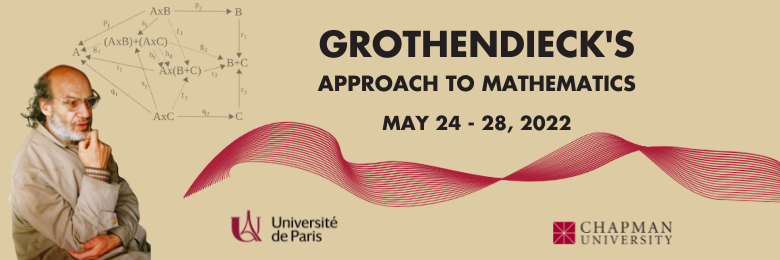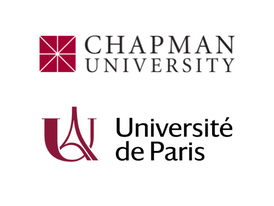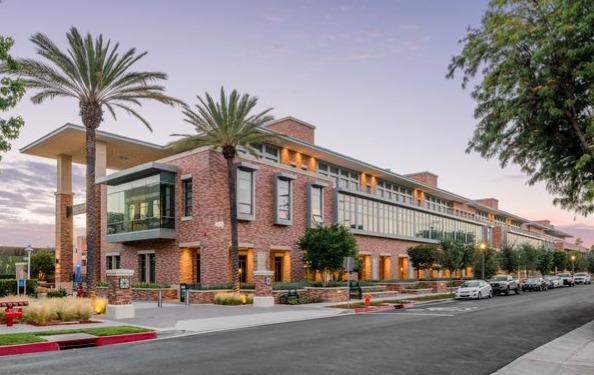
»Grothendieck, a Multifarious Giant: Mathematics, Logic and Philosophy
May 24 - 28, 2022
Chapman University hosted a conference honoring and exploring the contributions of Alexander Grothendieck to the field of Mathematics. This conference was sponsored by Chapman University and the University of Paris. We were honored to have our eminent guests here to speak to us on the revolutionary nature of Grothendieck.
The conference was held from Tuesday, May 24 through Saturday, May 28, at Chapman University in Orange, CA.
The Greatest Mathematician of His Time
Mathematician Alexander Grothendieck is seen at the blackboard during a lesson at IHES (High Scientific Studies Institute) south of Paris in the 1960s.More Information
Who is Alexander Grothendieck?
Alexander Grothendieck was born in Berlin in March 1928. He had a difficult and traumatic childhood. His mother was German and his father Russian, both of whom were politically active. They had migrated to France as refugees and Grothendieck joined them in France after a few years in 1939. His father eventually was murdered in Auschwitz. At school and later at Montpellier University, he was not happy with the textbooks and the way in which mathematics was taught. He would immerse himself for hours in a problem if it interested him. For example, during his days as a student at Montpellier University, working in complete isolation, he rediscovered measure theory and the Lebesgue integral.
1950-1960 were the golden years for mathematics. One of the two legendary sites of activity was IHES at Paris, where Grothendieck was working. (The Institute for Advanced Studies at Princeton was the other). From about 1954 to 1970, Grothendieck revolutionized algebraic geometry as part of an epic quest to prove the important Weil Conjectures of number theory. He had the idea that these could be translated into questions about geometry and settled that way. But making this idea precise required a huge amount of work. To carry this out, he started a seminar, giving talks almost every day, and enlisting the help of some of the best mathematicians in Paris.
Working nonstop for a decade, Grothendieck and his colleagues produced tens of thousands of pages of new mathematics, packed with mind-blowing concepts. In the end, using these ideas, Grothendieck succeeded in proving all the Weil Conjectures except the final, most challenging one — a close relative of the famous Riemann Hypothesis, still an open problem, and first published in Riemann’s groundbreaking 1859 paper.
Grothendieck received the Fields Medal (the equivalent of the Nobel Prize for mathematicians) in 1966 but turned it down in protest because he refused to travel to Moscow where the award was given. As an activist, he traveled to Hanoi to teach mathematics in the jungle to young Viet Cong in opposition to the American intervention in Vietnam. Grothendieck in the second part of his life started devoting himself to pacifism and to radical ecologism.
In 1973, Grothendieck left Paris to join the faculty in the University of Montpellier,
in part, motivated by his strong anti-elitist political views. He continued to produce
relevant mathematics but slowly withdrew from the mathematical community, admitting
only a handful of collaborating friends.
In 1991, he retired from university life and moved to a small village in the Pyrenees,
where he secluded himself and continued to work on mathematics. Over 20,000 pages
of his writings remain unpublished.
Committee
Local Organizing Committee
Peter Jipsen (Mathematics), Alexander Kurz (Computer Science), Andrew Mosher (Mathematics
and Computer Science), Marco Panza (Mathematics and Philosophy), Ahmed Sebbar (Physics
and Mathematics), Daniele Struppa (Mathematics)
External Collaborators
Colin Mclarty (Case Western Reserve University of Cleveland), Jean-Pierre Marquis
(University of Montreal), Jean-Jacques Szczeciniarz (University of Paris)
Speakers & Abstracts
Carmen Martines Adane
Abstract >
Slides >
Yves André
Abstract >
John Baez
Abstract >
Claudio Bartocci
Kevin Buzzard
Abstract >
Olivia Caramello
Jessica Carter
Abstract >
Slides >
Benjamin Collas
Silvio Ghilardi
Abstract >
Slides >
Jose Gil-Ferez
Slides >
Brice Halimi
Abstract >
Slides >
Simon Henry
Abstract >
Slides >
Fréderic Jaeck
Goro Kato
Abstract >
Elaine Landry
Abstract >
Slides >
Marco Panza
Slides >
Simona Paoli
Jean Pierre Marquis
Abstract >
Slides >
Drew Moshier
Colin McLarty
Abstract >
Giuseppe Rosolino
Abstract >
Slides >
Mohamed Saidi
Abstract >
Slides >
Ahmed Sebbar
Mike Shulman
Abstract >
Daniele Struppa
Abstract >
Slides >
Jean Jacques Szceciniarz
Abstract >
Matteo Viale
Abstract >
Andrés Villaveces
Slides >
Omar Wone
Slides >
Fernando Zalamea
Abstract >
Slides >

Special Thank You To Our Sponsors
